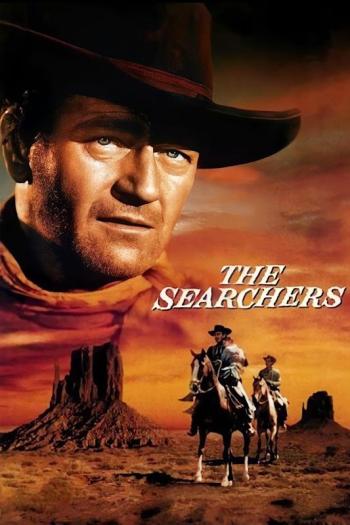A classic ride with the Johns: John Wayne in John Ford’s ‘The Searchers’
When our favorite Bates College professor and classic film consultant, Dr. Jon Cavallero and I began talking about the theme of this year’s classic series, “The Great Directors,” we, of course, started with Maine’s own John Ford who has been called Hollywood’s greatest chronicler of American history. But before I could even ask which movie—thinking how hard to choose between “The Grapes of Wrath” and “The Quiet Man,” John did not miss a beat in continuing, “and you will want to choose “The Searchers.” As the child of a father who only went to a movie if it starred John Wayne, I was intrigued, but honestly had no memory of ever seeing it and didn’t even really recognize the title. But he went on to say that it had to be seen on the big screen and that it what probably the best acting of Wayne’s career.
What he did not say, but what has become very clear to me as I have begun to read about this film, considered by many as the best western ever made, was that its impact goes far beyond the exquisite cinematography and stellar acting. Its plot reappeared in “Star Wars” and “Taxi Driver.” Wayne’s character’s line, “That’ll be the day” inspired Buddy Holly. But what was most important about this film was the blatant, unapologetic racism of Wayne’s character, Ethan Edwards. Roger Ebert had this to say about Ford’s viewpoint. “Countless westerns have had racism as the unspoken premise; this one consciously focuses on it. I think it took a certain amount of courage to cast Wayne as a character whose heroism was tainted.”
The story follows Edwards as he returns home to Texas after the Civil War. When members of his brother's family are killed or abducted by Comanches, he vows to track down his surviving relatives and bring them home. Eventually, Edwards gets word that his niece Debbie (Natalie Wood) is alive, and, along with her adopted brother, Martin Pawley (Jeffrey Hunter), he embarks on a dangerous mission to find her, journeying deep into Comanche territory.
Sadly, when the movie came out in 1956, the negative portrayals and attitudes regarding Native Americans was likely not even noteworthy because those views were accepted by many audiences. And we don’t know if Ford was buying into these images or if he was trying to hold them up for criticism. What I do know, is that I eagerly await the chance to see how this film holds up in 2023, especially because I will have just watched Scorsese’s, “Killers of the Flower Moon.” My heart tells me I will never experience as dramatic a juxtaposition in stories as this unintended and perhaps life-changing artistic pairing.
Please join us for “The Searchers” at 2 p.m. on Thursday, Nov. 9 and Saturday, Nov. 11, with introductory commentary via video by Dr. Cavallero.
Event Date
Address
185 Townsend Avenue
Boothbay Harbor, ME 04538
United States
























